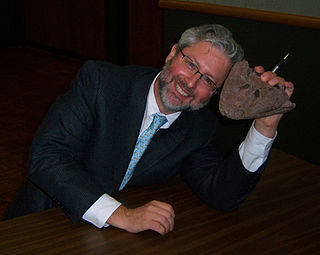A Quote by Martin Rees
If you represent the Earth's lifetime by a single year, say from January when it was made to December, the 21st-century would be a quarter of a second in June - a tiny fraction of the year. But even in this concertinaed cosmic perspective, our century is very, very special: the first when humans can change themselves and their home planet.
Related Quotes
Take the entire 4.5-billion-year history of the earth and scale it down to a single year, with January 1 being the origin of the earth and midnight on December 31 being the present. Until June, the only organisms were single-celled microbes, such as algae, bacteria, and amoebae. The first animal with a head did not appear until October. The first human appears on December 31. We, like all the animals and plants that have ever lived, are recent crashers at the party of life on earth.
The cosmic calendar compresses the local history of the universe into a single year. If the universe began on January 1st it was not until May that the Milky Way formed. Other planetary systems may have appeared in June, July and August, but our Sun and Earth not until mid-September. Life arose soon after. We humans appear on the cosmic calendar so recently that our recorded history occupies only the last few seconds of the last minute of December 31st.
The 21st century looks different. It's been very disruptive. It has created a lot of insecurity. We have to adjust to that, because the 21st century has real promise. Now, the higher-paying jobs of this new century are fantastic. The problem is, you have to have some level of higher education, maybe not a four-year degree, but some level of higher education, to get those jobs.
We on Earth have just awakened to the great oceans of space and time from which we have emerged. We are the legacy of 15 billion years of cosmic evolution. We have a choice: We can enhance life and come to know the universe that made us, or we can squander our 15 billion-year heritage in meaningless self-destruction. What happens in the first second of the next cosmic year depends on what we do, here and now, with our intelligence and our knowledge of the cosmos.
The first quarter-century of your life was doubtless lived under the cloud of being too young for things, while the last quarter-century would normally be shadowed by the still darker cloud of being too old for them; and between those two clouds, what small and narrow sunlight illumines a human lifetime!
The Information Age is, first and foremost, an education age, in which education must start at birth and continue throughout a lifetime. Last year, from this podium, I said that education has to be our highest priority. I have something to say to every family listening to us tonight: Your children can go on to college.... Because of the things that have been done, we can make college as universal in the 21st century as high school is today. And, my friends, that will change the face and future of America.
Thanks to the leadership of Vice President Gore, we have a government for the Information Age, once again a government that is a progressive instrument of the common good, rooted in our oldest values of opportunity, responsibility and community, devoted to fiscal responsibility, determined to give our people the tools they need to make the most of their own lives in the 21st century, a 21st century government for 21st century America.
Modern life... changes no longer century by century, but year by year, ten times faster than it ever has before-populations doubling, civilizations unified more closely with other civilizations, economic interdependence, racial questions, and-we're dawdling along. My idea is that we've got to go very much faster.

































